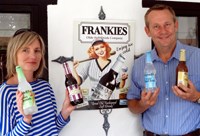
Related
Top stories



HR & ManagementNational minimum wage 2026: What workers (and employers) need to know
Danelle Plaatjies and Ludwig Frahm-Arp 10 hours



More news





















The latest development in this very public and very damaging fight - in which Frankie's, a KwaZulu-Natal Midlands micro-producer of premium soft drinks, claimed that Woolworths had cynically ripped off its range - is a resounding victory for Frankie's.
The Advertising Standards Authority (ASA) has found that, on a balance of probabilities, Woolworths had copied Frankie's trademarked "Good Olde Fashioned" strapline, which it has used since 2006. The ASA ordered Woolies to cease its related advertising, and within three months remove the packaging from its shelves.
Telling
It was telling, too, that Woolworths was found by the ASA to not have offered compelling evidence that it had not copied the Frankie's strapline.


Mike Schmidt, of Frankie's, was ebullient about this early win on Talk Radio 702's The Money Show, and said he was prepared to go all the way in his fight with Woolworths - despite not having the financial and legal resources that the retailer has. But the next bomb was about to drop.
Moments later, Woolworths CEO Ian Moir told The Money Show that the supermarket chain would not only abide by the ASA ruling, it would remove its soft drinks range altogether. Moir argued that, notwithstanding all the claims that had been made to date, consumer opinion had turned against Woolworths.
Woolworths didn't have to take such a drastic step (at least, not yet.) But clearly the ASA ruling stung Moir and his team, who were no doubt already feeling the heat from outraged customers, and something had to give.
Not easy
In one sense, one must congratulate Moir for grasping the nettle; it's not easy to take such a message to the marketplace. But he was clear: the customer is right, and Woolworths must listen. What a pity for Woolworths, though, that it hadn't listened two months ago, when Schmidt went public...
At the time, instead of immediately responding to this attack on its brand, Woolworths vacillated and turned down opportunities to defend itself. Bad move - it showed arrogance towards Frankie's, the issues at hand, the media and customers.
Woolworths also censored critical customer comments from its Facebook page. Even worse move - that merely heaped further contempt on its customers, its most important stakeholder group.
Eventually, Woolworths woke up to the fact that its wholly inadequate response was causing it further damage, and started to properly defend itself (with humans, not press releases.) But by then its protestations of innocence were being met, predictably, with scepticism and derision; it was a case of too little, too late.
Had the good grace
On radio, Moir had the good grace to concede that Woolworths had fumbled its communications early on. He said the retailer had initially stayed quiet as it figured out what to say, but with the benefit of hindsight this had been the wrong strategy and Woolworths had lost control of the discourse.
Too right, Woolworths had. The first rule of crisis communications is to say something tangible and truthful, and say it quickly. If you allow your detractors their head and say nothing yourself, you'll never win the communication battle, and a belated defence will always sound hollow.
But Woolies broke other rules, too. For example, defending yourself with a press release is a bad idea; it's a one-way, arrogant communication. Another one: making still-unproven allegations that cinnamon cola is not a unique Frankie's flavour, and was sold in South Africa 30 years ago.
The bottom line? Woolworths has finally done the right thing - in reality, more than the right thing - and is being seen to do it. That's great crisis communications strategy. And Moir was clever to attribute this decision to the feelings of Woolworths' customers - also a good move.
Too little, too late?
But is it again a case of too little, too late? Will consumers buy into Woolworths' argument that it's doing the right thing, considering that it hasn't until now, and the ASA has effectively also said so? I suspect that most people will take a "ja, right" stance and see the product withdrawal as damage control by an errant retailer.
Now things can return to normal, however, and Frankie's will eventually be forgotten when shoppers go and buy their convenience meals.
But things may have played out very differently, had Woolworths actually got its communications right in the first place. Goliath could have stomped on Samson David.
Had it immediately defended itself robustly at every opportunity, and been forthcoming with relevant (and verified) information to counter Schmidt's claims, it might well have drowned him out eventually, and forced him to give up the fight. At the very least, the picture being sketched in the media would not have been as pro-Frankie's.
Reputational damage
Woolworths may also have been able to retain its drinks range, and not worry about great reputational damage. And it no doubt would have made more money over Christmas, than less.
Frankie's, in turn, would have had much more of an uphill battle, and would not have enjoyed the immense public exposure it has. I'm a new fan of the brand, for example, and I know plenty of others, too.
Woolworths should fire its communications people. I would.
For more:
Corrected at 1.43pm on 3 February 2012.
